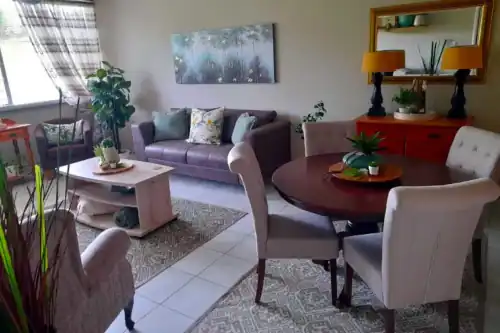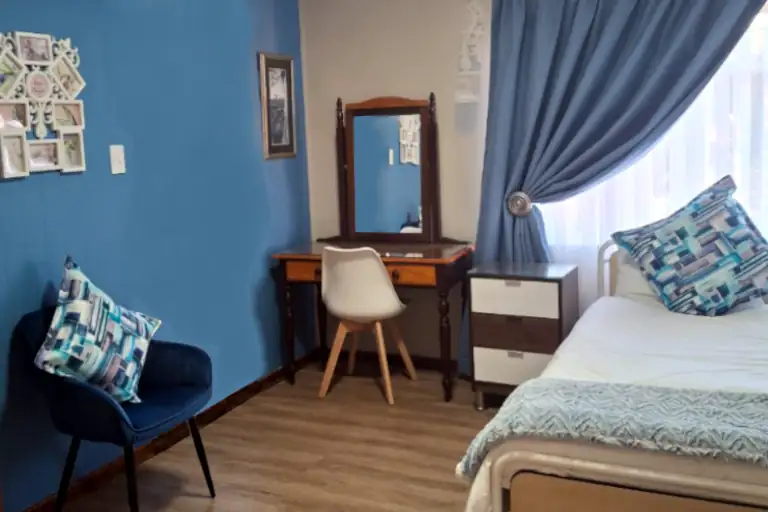Premium Retirement Meets Unretirement – Why La Gratitude is a basis for purpose-filled later life
Work, then exit. Income, then a downgrade. Influence, then the sidelines. However, reality is telling a different story. Across South Africa and the world, more people are choosing to continue working in some form after “retiring”, reshaping later life around flexibility, purpose, and dignity.
Yet there is a lingering belief that if you still work after 60, it must mean something went wrong. Maybe you did not save enough, did not plan well enough, or did not “earn” the right to rest. It is a quiet, often unspoken judgment that can make any idea of work in later life feel like failure rather than strategy.
The emerging concept of unretirement offers a very different picture. It describes a growing group of people who intentionally return to work, consult, start small ventures, or volunteer after formal retirement. They are protecting their finances, keeping their minds sharp, and staying socially connected in ways that support real long-term wellbeing. For many, this is less about survival and far more about designing a life that still feels meaningful.
At La Gratitude in Newcastle, we see this shift every day. Residents want security, frail care on standby, and elegant surroundings – and they also want options. This post unpacks what unretirement really means, why it is rising in South Africa, and how a premium retirement environment can make it safer, calmer, and far more life-giving.
Modern Living Flats

Basic Cottages

Modern Comfort Cottages

Comfortable Frail Care

What Unretirement Really Means Today
Unretirement is the decision to stay economically and socially active beyond traditional retirement, often in more flexible ways. It can look like a phased step-down from full-time work to a reduced schedule, consulting on selected projects, teaching, mentoring, or running a side business from the comfort of a beautifully maintained cottage.
International research shows that more than a quarter of retirees follow a non-traditional retirement path, returning to paid work after initially stepping away. In the UK, almost one in six retirees has already unretired to cope better with costs and to stay engaged. In South Africa, recent insights suggest nearly nine in ten adults under 60 expect to keep working in some capacity after 65.
This is not a small, fringe movement; it is becoming the new normal. Longer life expectancy, rising costs, and a shift from guaranteed pensions to self-managed savings all encourage older adults to keep an income stream for longer. For many upper-middle-class households, unretirement is a strategic lever to preserve capital, simplify decisions for adult children, and sustain a preferred lifestyle instead of constantly cutting back.
Unretirement, in other words, is increasingly less about “having to work” and more about “choosing how you will keep contributing.”

Why So Many South Africans Are Considering Unretirement
South Africans are facing a very honest numbers story. National reports suggest that only around 6% of South Africans are on track to retire comfortably, with many households feeling the pressure of extended life expectancies and insufficient pension replacement ratios. For discerning retirees, this does not mean panic; it means recalibration.
Unretirement becomes one of the most effective tools in that recalibration. Even a modest income from consulting, part-time work, or a small enterprise can significantly slow down how quickly you draw on your investments. Studies show that working a few additional years can lift retirement income by 10% or more over time, simply because capital has more time to grow while withdrawals are delayed.
Beyond the maths, there is a lifestyle conversation. Many seasoned professionals feel too young, too capable, and too curious to step away completely. They have networks, reputation, and specialised skills that still carry value. Unretirement allows them to harness that value on terms that respect energy levels, health realities, and family priorities.
The question is no longer, “Will I work again after retiring?” It is, “If I stay engaged, how do I want that to look?”
The Psychological Upside of Staying Engaged
Retirement is often marketed as endless leisure, but the human mind is wired for purpose, contribution, and challenge. Multiple studies show that when mentally active people retire completely, verbal memory and certain cognitive functions can decline significantly faster than before. In a major long-term study, memory declined about 38% faster after retirement for those leaving cognitively demanding roles.
Unretirement protects against that slide. Continued involvement in stimulating work – even just a few days a week – helps preserve mental agility. Problem-solving, planning, decision-making, and social interaction all act like exercise for the brain, keeping it responsive and resilient.
There is also a deep emotional benefit. Structured engagement provides rhythm to the week, reasons to get up and show up, and opportunities to feel useful. For many people who have led teams, built companies, or carried responsibility for years, a sudden stop can feel like identity loss. Thoughtful unretirement offers a way to keep a healthy sense of self without the pressure of full-time performance.
Staying engaged in later life is less about chasing productivity and far more about preserving clarity, dignity, and a grounded sense of who you are.
Unretirement and the Need for a Secure, Elegant Home Base
For unretirement to work well, the home environment matters. It is one thing to keep working; it is another to do so from a setting that supports your health, safety, and peace of mind. This is where a community like La Gratitude becomes a strategic anchor.
Located in Newcastle, La Gratitude offers independent cottages and flats along with 24/7 frail care, specialised dementia support, and a calm, secure setting in Northern KwaZulu-Natal. Residents do not have to worry about property maintenance, security, or the availability of care if health needs change.
That layer of stability frees energy to focus on meaningful work, volunteering, side hustles, or study.
Unretirement is far less stressful when you know that support is already in place. Adult children can rest easier, knowing that parents are not carrying the full burden of home security, home care, and emergency response on their own. For residents, this means any consulting or part-time work becomes an enhancement to life, not a desperate safety net. A premium retirement base transforms unretirement from a risk response into a calm, forward-looking lifestyle choice.
Practical Models of Unretirement
One of the strengths of unretirement is its flexibility. It can take several forms, each suited to different personalities and financial needs. For some, a phased exit from a current employer – moving from five days a week down to three – offers continuity of income and a gentler transition into retirement. For others, a clean break followed by carefully chosen consulting projects feels more energising.
There are also encore-style roles that focus on meaning and contribution: mentoring younger professionals online, serving on boards, tutoring, or supporting local community initiatives. Side hustles, increasingly common in South Africa, range from online advisory services to craft or food-based micro-businesses that can be run directly from a well-equipped cottage.
Each of these models can be scaled up or down as health, interest, and family dynamics shift. Residents are able to adjust without sacrificing safety or stability, because the underlying living environment remains secure, predictable, and well-managed.
The strength of unretirement lies in designing a pattern of work that serves your life, instead of organising your life around work.
More About La Gratitude Accommodation
Family and Financial Peace of Mind
For many families, retirement decisions are not made in isolation. Adult children are often part of the conversation, quietly balancing concern for their parents’ well-being with their own work, finances, and responsibilities. Unretirement, when thoughtfully planned, can reduce pressure on both generations.
A modest, steady income stream can help cover personal preferences – travel to visit grandchildren, hobbies, private medical expenses – without constantly drawing on capital or leaning on children. At the same time, living in a community with established frail care and assisted living options means that future healthcare needs are anticipated rather than feared.
Financial research increasingly points to the strength of “hybrid” retirement strategies that combine living annuities, possibly some guaranteed income, and continued work in some form. In practice, this means your investments are given room to breathe while unretirement income handles everyday demands. When income, care, and accommodation are stabilised, families can focus on relationships instead of crisis management.
Designing Your Unretirement Strategy
Every unretirement story is personal. There is no single correct model, but there are thoughtful questions that help clarify the right fit.
- First, motivation: are you primarily looking to strengthen your finances, or do you mainly want purpose and stimulation? Many people hold both motivations together, but knowing which leads will shape how you say yes or no to opportunities.
- Second, energy: what level of responsibility still feels healthy? That answer may change over time, and that is perfectly acceptable.
- Third, boundaries: unretirement works best when it is planned. It is wise to set limits on hours, travel, and stress, and to define up front how work must fit around rest, health appointments, family visits, and community life.
A supportive environment like La Gratitude makes those boundaries easier to honour because the rest of life is structured to be predictable and calm. The most successful unretirement strategies always start with clarity about the life you want, and only then decide what kind of work belongs inside it.
Choosing Unretirement on Your Terms
Unretirement is reshaping what later life can look like for capable, discerning adults across South Africa. The old script of “work hard, stop suddenly, then hope your savings last” no longer fits a world of longer life expectancy, complex markets, and active older adults who still have much to give.
A more realistic and empowering script is emerging. It blends selective work, protected capital, mental stimulation, social connection, and high-quality care into one coherent way of living. For many, that means anchoring unretirement in a premium, secure environment like La Gratitude – where independent cottages, beautiful gardens, professional frail care, and a strong sense of community provide the foundation for exceptional living.
If you are considering your next season, it may help to stop asking whether you should retire or keep working. A better starting point is to ask what kind of life will let you feel safe, purposeful, and at peace – and then to use unretirement as one of the tools that helps you build exactly that.
Citations
- PensionBee Blog, “Why ‘unretirement’ is on the rise” (2025), discussing UK retirees returning to work and financial motivations. https://www.pensionbee.com/uk/blog/2025/july/why-unretirement-is-on-the-rise
- 10X Investments, Retirement Reality Report (2023/2024), highlighting that only around 6% of South Africans are on track to retire comfortably. https://www.10x.co.za/library/10x-retirement-reality-report
- EasyEquities Blog, “Unretirement: Why Life Doesn’t Stop at 65” (2025), citing FNB data that nearly 90% of under-60s expect to work in retirement. https://blogs.easyequities.co.za/unretirement-why-life-doesnt-stop-at-65
- Xue et al., “Effect of retirement on cognitive function: the Whitehall II study,” European Journal of Epidemiology (2017). https://pmc.ncbi.nlm.nih.gov/articles/PMC6153553/
- “La Gratitude Home elects new chairperson at annual general meeting,” Northern Natal News (2024), confirming accommodation options and frail care services. https://www.citizen.co.za/northern-natal-news/news-headlines/local-news/2024/06/18/la-gratitude-home-elects-new-chairperson-at-annual-general-meeting/
Unretirement Key Statistics
| Indicator | Region | Figure | Note |
| Retirees following non-traditional paths (including unretirement) | Global/US | ~26% of retirees | Reflects return to work after initial retirement. |
| Retirees who have already unretired | United Kingdom | ~16% | Many return due to cost-of-living pressures. |
| Adults on track for comfortable retirement | South Africa | ~6% | Highlights the need for hybrid and unretirement strategies. |
| Under-60s expecting to work after 65 | South Africa | ~90% | Many plan part-time work, consulting or side hustles in later life. |
| Average replacement ratio decline | South Africa | 35% to 32% (2019–2021) | Indicates reduced income from pensions and savings. |
Thank you for your continued support. We appreciate your likes, follows, and retweets on Facebook, Twitter, Pinterest, and LinkedIn. Make sure to share this post with friends and family.
You can make a difference
With your assistance, the volunteers at La Gratitude will be able to take better care of not only the residents at the old age home but also the greater Newcastle community. La Gratitude is constantly involved in outreach projects to help the elderly in need in and around Newcastle.
Your donations will be greatly beneficial in the provision of food and other basic necessities for the less fortunate elderly people that require assistance.
Donating is easy, click here to donate now.











